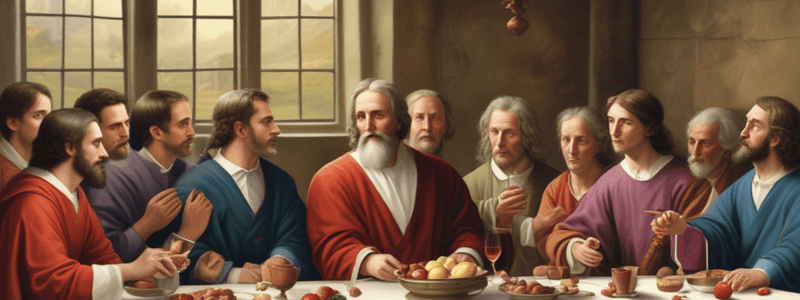Podcast
Questions and Answers
According to Zwingli, the Lord's Supper is a mere symbol.
According to Zwingli, the Lord's Supper is a mere symbol.
True (A)
Luther and Zwingli agreed on the nature of the Lord's Supper.
Luther and Zwingli agreed on the nature of the Lord's Supper.
False (B)
The Latin word 'sacramentum' carries the meaning of a military oath.
The Latin word 'sacramentum' carries the meaning of a military oath.
True (A)
For Zwingli, the Lord's Supper is only about commemorating Christ's death.
For Zwingli, the Lord's Supper is only about commemorating Christ's death.
John 6 is not a key passage for understanding the Lord's Supper.
John 6 is not a key passage for understanding the Lord's Supper.
The Lord's Supper has no implications for church discipline and excommunication.
The Lord's Supper has no implications for church discipline and excommunication.
Paul's language in 1 Corinthians 11 implies a symbolic understanding of the Lord's Supper.
Paul's language in 1 Corinthians 11 implies a symbolic understanding of the Lord's Supper.
In Zwingli's view, the Lord's Supper has a role in sanctification and sealing the gospel in believers' hearts.
In Zwingli's view, the Lord's Supper has a role in sanctification and sealing the gospel in believers' hearts.
Johannes Oecolampadius was a reformer of Zurich.
Johannes Oecolampadius was a reformer of Zurich.
Martin Butzer was a professor at the University of Cambridge.
Martin Butzer was a professor at the University of Cambridge.
The debate at Marburg was between Luther and Zwingli only.
The debate at Marburg was between Luther and Zwingli only.
Johannes Oecolampadius died a peaceful death in 1531.
Johannes Oecolampadius died a peaceful death in 1531.
Martin Butzer was a key figure in the Lutheran Reformation.
Martin Butzer was a key figure in the Lutheran Reformation.
The Marburg Colloquy resulted in a full theological agreement between Lutherans and Zwinglians.
The Marburg Colloquy resulted in a full theological agreement between Lutherans and Zwinglians.
Zwingli brought Oecolampadius to the Marburg Colloquy to discuss Lutheranism.
Zwingli brought Oecolampadius to the Marburg Colloquy to discuss Lutheranism.
The Marburg Colloquy took place in Zurich.
The Marburg Colloquy took place in Zurich.
According to the Lutheran account, Zwingli weeps because he is secretly satisfied that his scheme to split the church has reached fruition.
According to the Lutheran account, Zwingli weeps because he is secretly satisfied that his scheme to split the church has reached fruition.
Luther and Zwingli had a close and amicable relationship.
Luther and Zwingli had a close and amicable relationship.
Calvin was openly critical of Luther's theology and character.
Calvin was openly critical of Luther's theology and character.
John Owen criticized Luther directly in his writings.
John Owen criticized Luther directly in his writings.
Luther's bravery and heroism were major factors in why later Protestants were hesitant to criticize him.
Luther's bravery and heroism were major factors in why later Protestants were hesitant to criticize him.
Zwingli used John 6 to support his Eucharistic theology.
Zwingli used John 6 to support his Eucharistic theology.
The Marburg Colloquy was a successful attempt to unify the Lutheran and Zwinglian branches of Protestantism.
The Marburg Colloquy was a successful attempt to unify the Lutheran and Zwinglian branches of Protestantism.
Luther's followers were universally criticized by later Protestant theologians.
Luther's followers were universally criticized by later Protestant theologians.
Calvin believed that Christ is present in the Lord's Supper in a real sense.
Calvin believed that Christ is present in the Lord's Supper in a real sense.
Luther and Zwingli had a cordial relationship.
Luther and Zwingli had a cordial relationship.
Melanchthon was more friendly to Calvin than to Zwingli.
Melanchthon was more friendly to Calvin than to Zwingli.
The Marburg Colloquy was a successful attempt to unite Lutherans and Zwinglians.
The Marburg Colloquy was a successful attempt to unite Lutherans and Zwinglians.
Calvin's view of the Lord's Supper was similar to Luther's.
Calvin's view of the Lord's Supper was similar to Luther's.
Luther believed that the Lord's Supper is a mere symbol.
Luther believed that the Lord's Supper is a mere symbol.
The Protestant church maintained a degree of unity in its early years.
The Protestant church maintained a degree of unity in its early years.
Zwingli and Calvin were in agreement on the nature of the Lord's Supper.
Zwingli and Calvin were in agreement on the nature of the Lord's Supper.
Luther and Zwingli were able to come together and find a unified way forward on the issue of the Lord's Supper.
Luther and Zwingli were able to come together and find a unified way forward on the issue of the Lord's Supper.
Melanchthon's modifications to the Augsburg Confession in 1540 were seen as strengthening the language about the Lord's Supper.
Melanchthon's modifications to the Augsburg Confession in 1540 were seen as strengthening the language about the Lord's Supper.
Calvin subscribed to the original 1530 version of the Augsburg Confession.
Calvin subscribed to the original 1530 version of the Augsburg Confession.
Luther and Zwingli were the only participants in the debate at Marburg.
Luther and Zwingli were the only participants in the debate at Marburg.
Luther's followers criticized Melanchthon for his views on the Lord's Supper.
Luther's followers criticized Melanchthon for his views on the Lord's Supper.
The varia of the Augsburg Confession is the original version of the document.
The varia of the Augsburg Confession is the original version of the document.
Luther believed that unbelievers literally eat the body and blood of the Lord Jesus Christ during the Lord's Supper.
Luther believed that unbelievers literally eat the body and blood of the Lord Jesus Christ during the Lord's Supper.
The issue of the Lord's Supper was a key point of disagreement between Luther and Zwingli during the Reformation.
The issue of the Lord's Supper was a key point of disagreement between Luther and Zwingli during the Reformation.
Study Notes
The Lord's Supper: Zwingli and Luther's Views
- For Zwingli, the Lord's Supper is an opportunity to reflect on Christ's death and to publicly express unity with others in the church service.
- Zwingli's view is seen as more relatable and easier to understand, having a common sense appeal.
Challenges to Zwingli's Position
- One problem with Zwingli's position is the interpretation of John 6, which can be seen as either a Lord's Supper reference or not.
- Another issue is the powerful language Paul uses about the Lord's Supper in 1 Corinthians 11, implying that something more than symbolism is involved.
- If the Lord's Supper is seen as purely symbolic, then church discipline and excommunication lose their effectiveness.
Luther's View
- Luther is seen as a heroic figure, but also as an angry and stubborn personality.
- Luther's followers are often criticized instead of Luther himself, due to his bravery and heroic stand.
- Luther's view is that Christ is really offered and received by faith.
The Marburg Colloquy
- The Marburg Colloquy was a meeting between Zwingli and Luther, where they came close to agreement on 14.5 out of 15 theological points.
- The key issue that caused the discussion to fall apart was the real presence of Christ in the Lord's Supper.
- The divide ultimately meant there could be no military alliance between the two sides.
Oecolampadius and Butzer
- Johannes Oecolampadius was a reformer of Basel and Zwingli's patristic specialist.
- Martin Butzer was a great ecumenical figure who strove for common ground and agreement.
Calvin's View
- For Calvin, Christ is present by faith, and our minds are lifted up to heaven where he is.
- Calvin's view is seen as enriching and expanding Zwingli's position, but denying Luther's view of real presence.
Legacy of the Reformation
- If a powerful Swiss-German alliance had emerged, the Reformation would have looked significantly different.
- The division between Luther and Zwingli had a lasting impact on the Protestant church.
Studying That Suits You
Use AI to generate personalized quizzes and flashcards to suit your learning preferences.
Related Documents
Description
Explore the significance of the Lord's Supper in Christian theology, its importance according to Zwingli and Luther, and its relation to the death of Christ. Reflect on the unity of believers in the church service.




